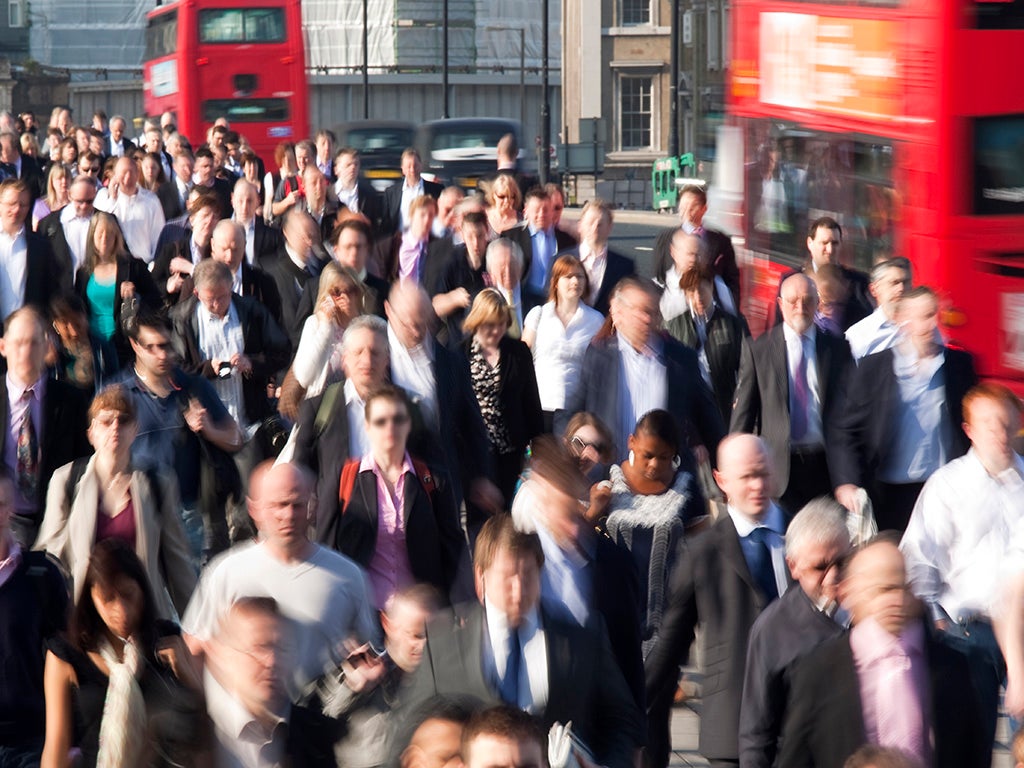London bus strike: Why commuting is stressful, and how to make the most of alternative routes
The average UK commute is 54 minutes - Londoners have the longest in the country at 74 minutes, almost twice the worldwide average of 40 minutes

With Tuesday’s bus strike involving 27,000 workers at 18 companies across London, it seems fair to say commuters will be feeling stressed out by the delays likely to result. But commuting is always stressful.
London has the lowest levels of car ownership in the UK, and by a distance the highest proportion of people using public transport in the UK. Commuting is becoming ever more appealing to Londoners attempting to reconcile their employment needs with the hugely inflated local property prices. Moving to one of 21 towns less than an hour's commute from London cuts the cost of home buying by an average £380,000. Slightly more realistic house prices of £260,000 make the latest price hike to just over £5,000 for a season ticket seem almost reasonable. The tariff might be one of the highest in the world but it offers a potential lifeline to those who cannot afford the massive costs of London housing but make their living in the city.
Commuting, though, is very much a necessary evil, something to be put up with and endured rather than celebrated - as seen from two thirds of respondents to a poll this winter highlighting public transport as the most stressful part of life in the capital. Indeed, those living within London’s commuter belt are the most stressed out people in the UK.
Commuting in London is understandably stressful as it takes so long: the average UK commute is 54 minutes but Londoners have the longest in the country at 74.2 minutes, almost twice the worldwide average of around 40 minutes. Commuting is inherently stressful for mind and body and to do so much of it makes those travelling in and around London especially susceptible.
When commuting we become reliant on others to get us where we want to go on time, which puts us on edge. Commuting also tends to make us more isolated, with a US study suggesting that every 10 minutes of commuting we engage in reduces social capital by 10 per cent in turn. Such a trend implicates travel time in reducing the networks of friends and acquaintances we build up meaning we have fewer people to talk to about our problems and fears.
This is the loneliness of the crowds: while are surrounded by other people while commuting, they are strangers at best, more likely rivals to compete with and antagonise us. Commuting has even been cited as a major cause of marriage break-up. A recent Swedish study revealed that those travelling for longer than three quarters of an hour to get to work are 40 per cent more likely to divorce their partner.
Best commuter towns in the UK
Show all 10Mental stress often goes hand-in-hand with physical ailments and we are typically locked in a vicious circle of tension. Indeed, commuting is identified as a major cause of neck, back and shoulder pain as being herded in and of out of cramped, overcrowded carriages and buses twice a day wears down the joints over time.
Public transport is thoroughly utilitarian, with practical considerations to maximise the number of people that can be safely carried taking priority over concessions to ergonomics in design. At the same time, we commuters give more thought to squeezing into a seat or holding on as tight as we can when standing rather than evaluating our posture to see whether our shoulders are hunched up or assessing whether our sitting position is contorting our spine. Such distractions mean many commuters do not realise that their physical complaints are exacerbated by public transport use.
Those who rely on public transport are far less likely to take regular exercise while also being much more likely to substitute wholesome home-cooked food with ready meals and take-away. When a stressful commute is added to a gruelling day of work, it can be hard to find the energy to source ingredients and prepare a proper meal. Such trends are made worse by longer commutes and those that involve changes.
American research has found that commuting presents as the most significant lifestyle factor leading us to become overweight. In this research, the amount of miles travelled to and from work directly correlates to weight gain. This trend implicates commuting in the obesity epidemic that has travelled from the US and into the UK where 13 million of us rarely – or never – take exercise.
Active travel – walking and cycling to work – can take some of the stress out of commuting. Of course, a transport mode that involves exercise is good for physical health but recent research has highlighted it can make us feel better mentally as well. The study looked at 18,000 commuters over two decades and found that those who switched to active travel experienced improvements in their psychological wellbeing. They felt less strain, were more able to concentrate and reported reduced incidences of insomnia.
Maybe the bus strike is a good excuse to take a long walk and get to work feeling a little better about your lot.
Subscribe to Independent Premium to bookmark this article
Want to bookmark your favourite articles and stories to read or reference later? Start your Independent Premium subscription today.

Join our commenting forum
Join thought-provoking conversations, follow other Independent readers and see their replies